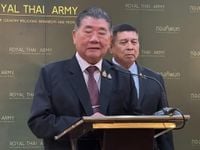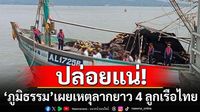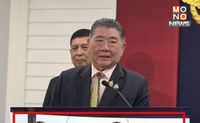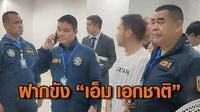On March 28, 2025, Bhumidharm Vejayachai, the Deputy Minister and Acting Minister of Defense of Thailand, addressed reporters regarding the recent announcement from Myanmar's State Administration Council about granting amnesty to four Thai fishing crew members. This decision, he explained, is the result of ongoing coordination between the Thai Ministry of Foreign Affairs and the Royal Thai Army, utilizing both diplomatic and military channels. The collaboration also involved the military attaché in Yangon and the National Maritime Interests Protection Center.
Bhumidharm noted that the delay in the release of the Thai crew members was due to the case entering Myanmar's judicial process, which necessitated adherence to local legal protocols, preventing direct negotiations through local mechanisms. He stated, "Both sides have shown positive signals of cooperation and understand the limitations involved, so it is difficult to specify an exact date for their release. However, I assure you that their release will happen soon." This commitment reflects the Thai government's dedication to resolving the situation amicably, despite the complexities of international law.
The Deputy Minister's comments come amid rising tensions concerning Thailand's diplomatic relations with Myanmar, particularly following criticisms from various political factions within Thailand. Notably, Kanweer Suebsaeng, a member of the opposition party, expressed concerns about Thailand's invitation to Senior General Min Aung Hlaing to participate in the BIMSTEC summit, suggesting it could tarnish Thailand's image as a supporter of democratic values. In response, Bhumidharm remarked, "Mr. Kanweer has lied about many things; this issue should be directed to the Ministry of Foreign Affairs." His remarks indicate a clear division in the political landscape regarding how to engage with Myanmar's military government.
During a press conference at the Army Headquarters, Bhumidharm was asked about the ongoing protests led by Jatuporn Prompan, a political activist advocating for reforms, particularly concerning the entertainment complex legislation. Bhumidharm's reaction was one of skepticism, stating, "Oh! Jatuporn has never been consistent in his statements; do you still believe him?" This exchange highlights the contentious political atmosphere in Thailand, where various factions are vying for influence and control.
In addition to addressing the amnesty for the fishing crew, Bhumidharm also discussed the broader implications of media impersonation that has recently emerged as a significant issue in Thailand. He revealed that a criminal case involving the impersonation of media outlets has led to the arrest of four Thai victims. "This impersonation has caused significant damage and requires immediate action to address the issue systematically," he stated. He emphasized the need for cooperation among all stakeholders to mitigate the risks posed by such fraudulent activities.
The Deputy Minister made it clear that future incidents of impersonation would not be tolerated, warning that legal action would be taken against those who engage in such deceptive practices. He expressed concern that the ongoing investigation into the impersonation case could lead to increased fraudulent activities and that further scrutiny would be applied to the networks involved.
As discussions regarding the amnesty and media impersonation unfold, the Thai government remains under scrutiny from both domestic and international observers. The balancing act of maintaining diplomatic relations with Myanmar while addressing internal political dissent poses a significant challenge for the current administration. Bhumidharm's remarks reflect a commitment to navigating these complexities with caution.
While the Thai government appears to be making strides in securing the release of its citizens, the political ramifications of its engagement with Myanmar's military regime continue to spark debate. Critics argue that inviting Min Aung Hlaing to BIMSTEC could be perceived as legitimizing a government that has been widely condemned for its human rights abuses.
Moreover, the situation surrounding the Thai fishing crew members serves as a reminder of the delicate nature of international relations in Southeast Asia, where issues of sovereignty, justice, and human rights often intersect. As Bhumidharm indicated, the process of securing the release of the crew members has not been straightforward, and the complexities involved illustrate the challenges of diplomacy in the region.
In light of these developments, it remains to be seen how the Thai government will navigate the ongoing challenges posed by both internal dissent and external diplomatic pressures. As the situation evolves, the Thai public and international community will be watching closely to see how these issues are addressed.
In conclusion, the recent announcement of amnesty for the Thai fishing crew members highlights the intricate web of diplomatic relations and domestic politics that Thailand faces. Bhumidharm's assurances of cooperation and resolution are tempered by the realities of navigating an increasingly complex political landscape.







